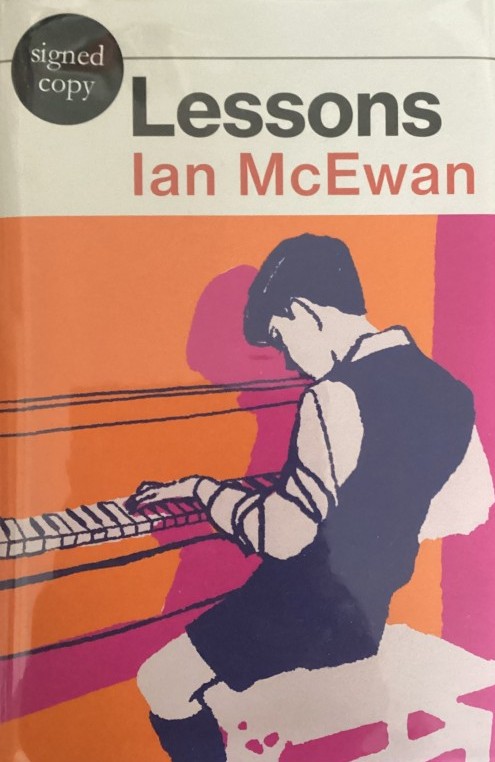Inspiring Older Readers
 posted on 16 Nov 2022
posted on 16 Nov 2022
Lessons by Ian McEwan
I’ve been buying and reading the more recent of Ian McEwan’s novels out of a sort of loyalty to an author whose earlier work felt essential and relevant. However, I’ve had the feeling that his creative well had run dry half a dozen books back and when I purchased his most recent publication, Lessons, I wondered whether this might be the last I’m likely to invest in. The last few publications were, at least, brief and slim affairs (in every sense) but this one is quite the opposite – a monster 500 page saga that attempts to span the key social and political events of what might be called the ‘boomer’ generation.
It's not just the length of the book that reminds me of a Victorian novel but his approach to the storytelling which unfolds at a steady pace and has aspects of a 'bildungsroman' - exploring the events life of an individual, Roland Baines, with a discursive relish. Baines is a rather passive, middle-class everyman figure to whom history happens and whose life is ultimately shaped by more decisive, more talented, more aggressive or more successful women. It’s hard to escape the feeling that McEwan has taken a look at his own life and cultural milieu and found it wanting – every time something potentially life affirming happens, Baines finds something to turn the milk sour.
Baines, a child of colonial rule, returns to a minor boarding school in England at the end of the 1950s where the eleven-year-old encounters the 25 year-old piano teacher, Miriam Cornell who uses her position to sexually abuse the boy and effectively grooms him into a dependent, long-term relationship. This is just the first of the lessons that will shape Roland’s whole life. We move backwards and forwards in time but the ‘relationship’ with the evidently mentally unstable Miriam Connell will keep swimming back into focus – sometimes in the shape of adolescent sexual fantasy and sometimes with a more modern-day sense of manipulative abuse. McEwan leaves the question of the impact of this abuse open to question or interpretation – just how much of Roland’s future life is the result of Miriam Connell’s actions?
Roland, now a modestly successful poet, marries the half-German Alissa and has a son Lawrence, who he is left to look after when his wife decides she must prioritise her urge to be a novelist over her responsibilities as a mother. He spends time wondering whether she will ever return but ultimately he accepts her decision and will eventually discover that she is in fact a potentially great novelist – a German writer worthy of taking her place alongside Grass or Mann.
The journey of discovery that Baines goes on makes him a sort of Zelig figure – an observer of history’s great events rather than a shaper or participant. Maybe this is the key message from McEwan – the world as it is now has become what it is because of the middle-class boomer generations’ passivity and complacency. Beejay Silcox reviewing the book for The Guardian puts it this way:
“McEwan’s sights are aimed squarely at the generation to which he belongs: those postwar children who “lolled on history’s aproned lap, nestling into a little fold of time, eating all the cream”. Roland is a prototypical baby boomer: raised by war-haunted veterans, loved at arm’s length, and schooled in “nuanced loutishness”. At his state boarding school, young Roland watches his classmates learn to be “conservative guardians of the existing order”, and perfect their tools of influence: satire, parody, mockery. As an adult, he watches as those same bullyboys weaponise that scorn. And yet, beyond smuggling Bob Dylan records into East Berlin in his 20s, Roland is never quite impelled to do anything; he’s complicit in his complacency. He’s voted the right way, after all: his conscience is clear.”
McEwan’s target is clearly the big issues of his and our time but, for me, the performance doesn’t quite match the ambition. The prose remains two-dimensional and the social history - the fall of the Berlin Wall; glasnost and perestroika; Thatcher; Aids; New Labour and the Iraq war; Brexit – comes in slabs as if we’ve been dipped into a history text book adapted for the uninformed reader.
There are also really irritating tics: McEwan insists on putting in dialogue in German and immediately following it with the English translation. Why? It’s just annoying. Either the German is necessary or its not – and here its not; it just comes across as showing-off.
This is a classic curate’s egg of a book – good in parts. But is it good enough to make me buy whatever McEwan comes up with next. I doubt it.
Terry Potter
November 2022